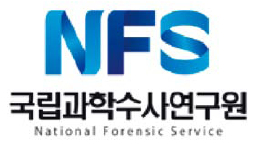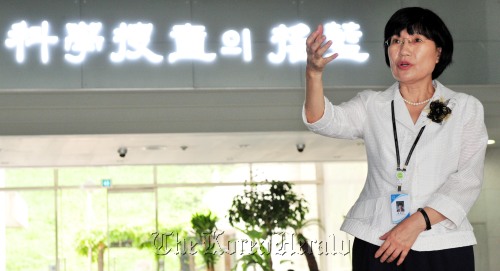Forensic agency boasts world-class science to catch the bad guys
“Mondays are busy here. A lot of dead bodies from the weekend,” said Chung Hee-sun with a friendly smile, as we sat down for an interview in her office in western Seoul. Behind her, the motto “Science sheds light on the truth” hung on the wall.

“My staff told me that we had a famous singer in for an autopsy over the weekend,” she continued, referring to Chae Dong-ha, a former leader of three-boy R&B band SG Wannabe who was found dead on Friday. A postmortem examination found that he had killed himself.
Gentle and soft-spoken, she was nothing like one would expect the boss of the state forensic agency to be.
A pioneer in narcotics analysis in Korea, Chung is director general of the National Forensic Service and a driving force behind Korea’s growing scientific criminal investigation expertise.
“Mondays are busy here. A lot of dead bodies from the weekend,” said Chung Hee-sun with a friendly smile, as we sat down for an interview in her office in western Seoul. Behind her, the motto “Science sheds light on the truth” hung on the wall.

“My staff told me that we had a famous singer in for an autopsy over the weekend,” she continued, referring to Chae Dong-ha, a former leader of three-boy R&B band SG Wannabe who was found dead on Friday. A postmortem examination found that he had killed himself.
Gentle and soft-spoken, she was nothing like one would expect the boss of the state forensic agency to be.
A pioneer in narcotics analysis in Korea, Chung is director general of the National Forensic Service and a driving force behind Korea’s growing scientific criminal investigation expertise.

Autopsy is just one of many services provided by NFS. It tests blood, hair, fingerprints and any evidentiary materials collected from crime scenes and conducts analysis on handwriting, voice, video and image evidence and more.
“We do all sort of things. The cleanest thing around here, we say, is urine,” she said jokingly. “People here see the darkest side of our society every day ― rapes and murders ... So I try to create a warm and positive atmosphere,” she said.
Chung became the director general of NFS in 2008 after three decades of dedication and service. She joined NFS, then the National Institute of Scientific Investigation, 33 years ago, after receiving her Ph.D in pharmacy at Sookmyung Woman’s University in Seoul.
Ever since, the NFS has been virtually “her everything.”
She met her husband here, who also held the post of NFS director general between 1999 and 2001.
“When I first joined, there was only about 40 staff here. We had to do almost everything manually because we didn’t have proper facilities and gear,” she recalled. She remembered a fake honey case back then. With no skills and technology, all she could do was tell that something other than honey had been added to the sample but couldn’t identify the substance.
Things have changed greatly since then.
The NFS now boasts about 300 staffers and its labs are equipped with a long list of cutting-edge equipment.
The morgue was refurbished three years ago, with a new ventilation system. “Before, people wouldn’t come near the building, because of the stench,” she said.
Over the years, Korea’s scientific investigation scene has made many strides as well.
DNA analysis only started in 1991 in Korea.
In the 2006 freezer babies case, the Korean authority identified a French woman as the mother of the two dead babies and a suspect, based on a DNA analysis. The French disputed tests conducted by the NFS. But she later confessed to the murder of her children, after the Korean tests were confirmed by French DNA tests.
In the 2009 case of serial killer Kang Ho-soon, the NFS detected a nanogram ― one billionth of a gram ― of one of the victim’s DNA on his jacket, which led eventually to Kang’s conviction.
Chung stressed that lab practice at NFS is fast approaching the global standard and has met international requirements.
“The level of our forensic tests and analyses is world-class, particularly in the field of DNA identification,” Chung said.
Still, there is room for improvement.
“We’re still short-handed. Our staff are way overloaded with routine work. Forensic examiners must have time to think in order to crack unsolved cases or develop a new method of analyzing evidences,” she said.
Korea has a very limited pool of forensic specialists, compared to other advanced countries.
By one yardstick showing the wide gap in forensic human resources, one forensic DNA analyst covers a population of 1.6 million in Korea, while the United Kingdom boasts a ratio of one expert per 100,000, she said.
Another challenge is the budget.
The annual budget of the NFS more than doubled under her stewardship, from 27.2 billion won in 2008 to 56.4 billion won in 2011. However, the money increase was mostly spent on renovation of old buildings and construction of new ones, she said. More funds are needed to buy new equipment to match the rapidly changing world of crime, and to give doctors a pay raise.
Staff at the NFS, doctors in particular, are overworked and low paid. “We’re a group of dedicated and self-motivated people, taking pride in the fact that what we do here is critical in catching the bad guys and thereby we contribute to making the country a safer place,” Chung said.
What’s encouraging is that more people are becoming aware of and appreciative toward the role of forensic scientists in search of justice.
This is, Chung said, thanks to the exposure of TV programs such as the famous U.S. TV series “CSI: Crime Scene Investigation” and Korean drama “Sign” which was aired early this year.
“I was greatly moved when I met an elementary school student who said to me that his dream has changed from becoming the United Nations secretary general to becoming a forensic expert.”
But, don’t believe everything you see on television, Chung said.
The Korean drama portrayed the NFS as a place of internal power struggle and under political pressure which sometimes led to manipulation of test results.
“That is just unthinkable. NFS staffs are single-minded, only interested in the case at hand and nothing else,” she said.
Chung holds the position of secretary general at the International Association of Forensic Toxicologists and hopes to use her international network to benefit the NFS.
“I am glad to tell you that Korea has been chosen to be the chair country of the Asia Foreign Sciences Network from 2013-2014,” she said. The AFSN annual meeting took place in Seoul last week.
Chung aims to host a meeting of a larger scale ― the general meeting of the International Association of Forensic Sciences in 2014.
“It will be a great chance to showcase Korea’s advanced scientific criminal investigation and be a boost in pride for our agency and us, forensic specialists,” she said.
By Lee Sun-young (milaya@heraldcorp.com)



![[AtoZ into Korean mind] Humor in Korea: Navigating the line between what's funny and not](http://res.heraldm.com/phpwas/restmb_idxmake.php?idx=644&simg=/content/image/2024/04/22/20240422050642_0.jpg&u=)
![[Exclusive] Korean military set to ban iPhones over 'security' concerns](http://res.heraldm.com/phpwas/restmb_idxmake.php?idx=644&simg=/content/image/2024/04/23/20240423050599_0.jpg&u=20240423183955)


![[Graphic News] 77% of young Koreans still financially dependent](http://res.heraldm.com/phpwas/restmb_idxmake.php?idx=644&simg=/content/image/2024/04/22/20240422050762_0.gif&u=)

![[Herald Interview] Why Toss invited hackers to penetrate its system](http://res.heraldm.com/phpwas/restmb_idxmake.php?idx=644&simg=/content/image/2024/04/22/20240422050569_0.jpg&u=20240422150649)





![[Exclusive] Korean military to ban iPhones over security issues](http://res.heraldm.com/phpwas/restmb_idxmake.php?idx=652&simg=/content/image/2024/04/23/20240423050599_0.jpg&u=20240423183955)



![[Today’s K-pop] Ateez confirms US tour details](http://res.heraldm.com/phpwas/restmb_idxmake.php?idx=642&simg=/content/image/2024/04/23/20240423050700_0.jpg&u=)